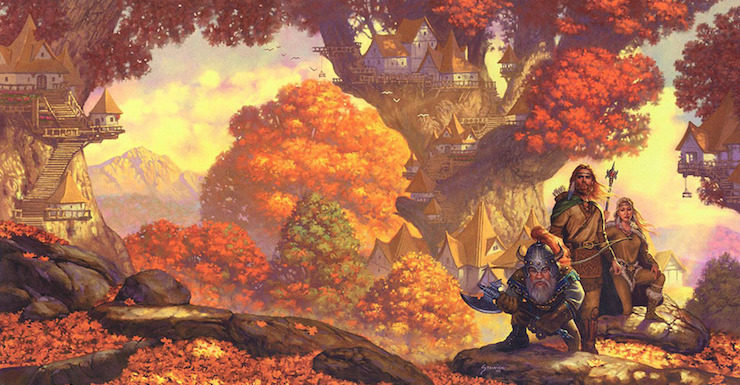I’ve loved games since childhood, everything from tag to the medieval imagery of chess to Dungeons & Dragons and first-person shooters. (I am terrible at first-person shooters, but sometimes it’s just cathartic to shoot pixel bad guys. Or, in my case, to be shot by them?) As a corollary, this meant that I also enjoy books related to games. Sometimes they’re about game-playing, and sometimes they’re set in the world of a game. Sometimes, as with gamebooks or Choose Your Own Adventure, the book is the game itself!
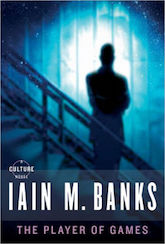
The Player of Games by Iain M. Banks
This was the first of two Banks novels that I’ve read. (The other is Surface Detail.) Its protagonist is a master game-player who is recruited, through trickery, to compete in a society where there is not only rampant game-playing but casual torture. Not only is the depiction of game-playing fascinating, there’s also a lot of political intrigue and skulduggery. If I ever write something a tenth as good I might be able to die happy.
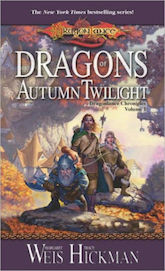 The Dragonlance Chronicles by Margaret Weis & Tracy Hickman
The Dragonlance Chronicles by Margaret Weis & Tracy Hickman
When I went to middle school in Texas, the big thing that all the kids were reading was Dragonlance. The Chronicles trilogy (Dragons of Autumn Twilight, Dragons of Winter Night, and Dragons of Spring Dawning) was the core of the setting and its storyline, and introduced a group of adventurers trying to save the world of Krynn against the armies of the newly returned Dragon Queen, including a former friend turned Dragonlord. I never did get a chance to play Advanced Dungeons & Dragons in the Dragonlance setting, but I collected and read the books for years. I would actually say that the sequels, the Legends trilogy (Time of the Twins, War of the Twins, and Test of the Twins) were the high point of Dragonlance, with a great time travel plot and sibling rivalry, but I’ll always remember the Chronicles fondly.
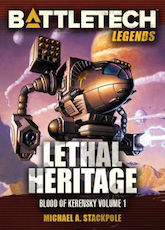 The Blood of Kerensky trilogy by Michael A. Stackpole
The Blood of Kerensky trilogy by Michael A. Stackpole
I learned about BattleTech through my boyfriend (now husband) in college, by paging through his books and listening to his stories about supreme warriors like Kai Allard-Liao and Natasha Kerensky. I already knew about mecha (giant robots) through manhwa and anime, but I was engrossed by his stories of the wars between the Inner Sphere and the Clans. Really, if you put in giant stompy robots, I’m there. It wasn’t until years later that I got my hands on some BattleTech novels and started reading. The Blood of Kerensky (Lethal Heritage, Blood Legacy, and Lost Destiny) is probably a great place to start: it has blood, guts, betrayal, big stompy robots (of course), and high-stakes political gambles, and describes the beginning of the Clan invasion.
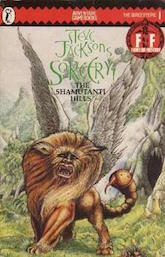 Steve Jackson’s Sorcery! by Steve Jackson
Steve Jackson’s Sorcery! by Steve Jackson
Yes, the exclamation point is part of the series title. This is a quartet of four fantasy gamebooks (The Shamutanti Hills, Kharé: Cityport of Traps, The Seven Serpents, and The Crown of Kings) that you can play through either as individual adventures or, more satisfyingly, as a four-part campaign. You play the part of an adventurer sent to recover the mythic Crown of Kings from the evil Archmage of Mampang Fortress who has stolen it. Along the way you may face Red-Eyes with laser eyebeams, a God-Hydra, a Manticore, and other threats, as well as unpredictable allies. It’s been decades since I first ran across one of these in a used bookstore and they remain my favorite gamebooks of all time.
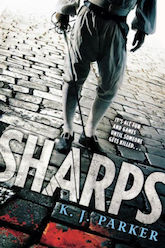 Sharps by K.J. Parker
Sharps by K.J. Parker
Sharps is, on the surface, about a diplomatic mission carried out by a fencing team. (The sword kind of fencing, not the backyard kind of fencing.) But because this is K.J. Parker, this rapidly devolves into intrigue, mishaps, and unlikely romance. It’s also a meditation on the difference between what is real (like a “sharp”) vs. an image (like a fencing foil, which is blunt). I liked this a lot when I read it initially, although it probably benefits from being read just after the related novel The Folding Knife, and now that I am taking fencing, I’d love to reread it to see how much more I get out of the fencing descriptions!
 Yoon Ha Lee is the Hugo, Clarke and Nebula award-nominated author of The Machineries of Empire trilogy (Ninefox Gambit, Raven Stratagem, and Revenant Gun) and mathematician from Houston, Texas. His work has appeared in Clarkesworld, Lightspeed and The Magazine Of Fantasy and Science Fiction and he has published over forty short stories. His critically acclaimed collection Conservation of Shadows was released in 2013. His first novel, Ninefox Gambit, won the 2017 Locus Award for Best First Novel. He lives in Louisiana with his family and an extremely lazy cat, and has not yet been eaten by gators.
Yoon Ha Lee is the Hugo, Clarke and Nebula award-nominated author of The Machineries of Empire trilogy (Ninefox Gambit, Raven Stratagem, and Revenant Gun) and mathematician from Houston, Texas. His work has appeared in Clarkesworld, Lightspeed and The Magazine Of Fantasy and Science Fiction and he has published over forty short stories. His critically acclaimed collection Conservation of Shadows was released in 2013. His first novel, Ninefox Gambit, won the 2017 Locus Award for Best First Novel. He lives in Louisiana with his family and an extremely lazy cat, and has not yet been eaten by gators.










